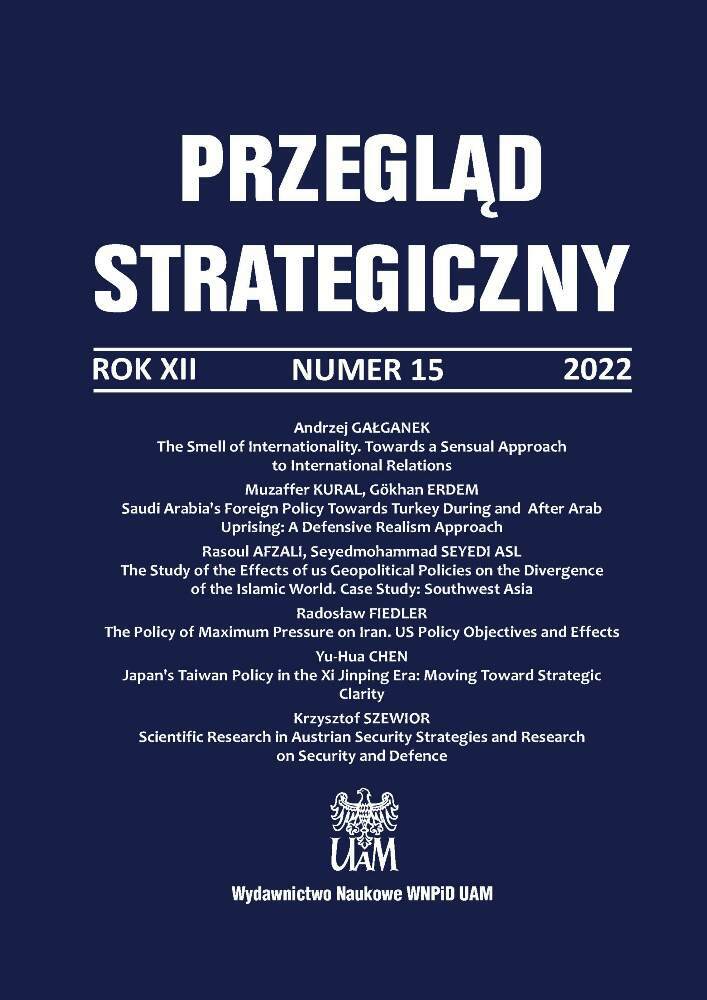Abstrakt
Japonia, podobnie jak USA, postrzega swoje relacje z Tajwanem w szerszym chińskim kontekście. Państwo to jeszcze do niedawna w swej polityce względem Chin oraz Tajwanu posługiwało się znaną z relacji USA–Tajwan koncepcją strategicznej ambiwalencji. Tymczasem, silne poparcie udzielone wyspie wobec coraz intensywniejszych nacisków ze strony ChRL, zdaje się sugerować, iż Japonia w swoich relacjach z Tajwanem zaczyna odchodzić od dotychczasowej polityki strategicznej ambiwalencji w stronę strategicznej jednoznaczności. Celem artykułu jest analiza przyczyn, jakie stały za zmianą japońskiej polityki wobec Tajwanu w ostatnich latach. Zdaniem autora, odejście władz Japonii od dotychczasowej polityki strategicznej ambiwalencji w stosunku do Tajwanu spowodowane jest strukturalną zmianą, jaka zaszła w polityce zagranicznej Japonii znajdującej swój wyraz zarówno w aspekcie normatywnym, jak i militarnym. Przyczyn owej zmiany autor upatruje we wzroście zagrożenia ze strony Chin oraz bezpośrednio związanej z tym presji USA wywieranej na swego japońskiego sojusznika.
Bibliografia
Armitage R. and Nye J. (2012), The U.S.-Japan Alliance: Anchoring Stability in Asia, Center for Strategic and International Studies (Washington D.C).
Green M. (2003), Japan's Reluctant Realism: Foreign Policy Challenges in an Era of Uncertain Power, Palgrave Macmillan, New York.
Liff A. P. (2021), Japan, Taiwan, the United States, and the "Free and Open Indo-Pacific", in: Essays on the Rise of China and Its Implications, edited by A. M. Denmark and L. Myers, Wilson Center, Washington D.C.: 271-299.
Liff A. P. (2019), Unambivalent Alignment: Japan's China Strategy, the US Alliance, and the 'Hedging' Fallacy, "International Relations of the Asia-Pacific", Vol. 19, No. 3. https://doi.org/10.1093/irap/lcz015 DOI: https://doi.org/10.1093/irap/lcz015
Japan Ministry of Defense (2021), Defense of Japan.
Japan Ministry of Defense (2019), Defense of Japan.
Japan Ministry of Foreign Affairs (2020), Diplomatic Bluebook 2020.
Japan Ministry of Foreign Affairs (2018), Diplomatic Bluebook 2018.
Japan Ministry of Foreign Affairs (2014), Diplomatic Bluebook 2014.
Japan's PM Refers to Taiwan as Country, Draws Fire from China, (2021), "Kyodo News", June 10, 2021, https://english.kyodonews.net/news/2021/06/7feb56acb3fe-japans-pm-refers-to-taiwan-as-country-draws-fire-from-china.html.
Miki R. and Kato M. (2021), Biden and Suga to Note Taiwan Strait in April Joint Statement, "Nikkei Asia", March 30, 2021, https://asia.nikkei.com/Politics/International-relations/Biden-s-Asia-policy/Biden-and-Suga-to-note-Taiwan-Strait-in-April-joint-statement.
Kennedy P. (2021), Parsing Japan's Support for Taiwan, "The Diplomat", September 11, 2021, https://thediplomat.com/2021/09/parsing-japans-support-for-taiwan/.
Osawa K. (2021), Japan's No. 2 Raises Possibility of Joining US in Defending Taiwan, "Nikkei Asia", July 6, 2021, https://asia.nikkei.com/Politics/International-relations/Indo-Pacific/Japan-s-No.-2-raises-possibility-of-joining-US-in-defending-Taiwan.
Paine S. C. (2003), The Sino-Japanese War of 1894-1895: Perceptions, Power, and Primacy, Cambridge University Press, New York. https://doi.org/10.1017/CBO9780511550188 DOI: https://doi.org/10.1017/CBO9780511550188
Park J. (2020), Japan Official, Calling Taiwan 'Red Line,' Urges Biden to 'Be Strong', "Reuters", December 25, 2020, https://www.reuters.com/article/us-japan-usa-taiwan-china-idUSKBN28Z0JR.
Samuels R. S. and Wallace C. (2018), Introduction: Japan's pivot in Asia, "International Affairs", Vol. 94, No. 4. https://doi.org/10.1093/ia/iiy034 DOI: https://doi.org/10.1093/ia/iiy034
Sahashi R. (2017), Japan's Strategic Hedging under Trump, "East Asia Forum", June 27.
Seiichiro T. (2006), The Taiwan Factor in Japan-China Relations, in: Japan's Relations With China: Facing A Rising Power, edited by Peng Er Lam, Routledge, London.
Shelbourne M. (2021), Davidson: China Could Try to Take Control of Taiwan In 'Next Six Years', "USNI News", March 9, 2021, https://news.usni.org/2021/03/09/davidson-china-could-try-to-take-control-of-taiwan-in-next-six-years.
Solís M. (2020), The Underappreciated Power, "Foreign Affairs", Nov/Dec: 123-132.
Stokes B. (2016), Hostile Neighbors: China vs. Japan, "Pew Research Center", September 13, 2016, https://www.pewresearch.org/global/2016/09/13/hostile-neighbors-china-vs-japan/.
The International Crisis Group (2013), Dangerous Waters: China-Japan Relations on the Rocks, April 8 2013.
Thomas N. and Williams B. (2017), Taiwan's Sub-national Government Relations with Japan: Post-1979 Developments, "Journal of Contemporary Asia", Vol. 47, No. 1. https://doi.org/10.1080/00472336.2016.1238499 DOI: https://doi.org/10.1080/00472336.2016.1238499
Tsai S. (2009), Maritime Taiwan: Historical Encounters with the East and the West, M. E. Sharp, Armonk-New York.
Wendt A. (1999), Social Theory of International Politics, Cambridge University Press, Cambridge. https://doi.org/10.1017/CBO9780511612183 DOI: https://doi.org/10.1017/CBO9780511612183
Wendt A. (1992), Anarchy Is What States Make of It: The Social Construction of Power Politics, "International Organization", Vol. 46, No. 2. https://doi.org/10.1017/S0020818300027764 DOI: https://doi.org/10.1017/S0020818300027764
Xin Z. (2021), Securing Taiwan: Separating the Two Sides of the Taiwan Strait in Japan's China Policy, "Asian Studies Review": 1-17. https://doi.org/10.1080/10357823.2021.1935465 DOI: https://doi.org/10.1080/10357823.2021.1935465
Zhang F. (2012), Rethinking China's Grand Strategy: Beijing's Evolving National Interests and Strategic Ideas in the Reform Era, "International Politics", Vol. 49. No. 3. https://doi.org/10.1057/ip.2012.5 DOI: https://doi.org/10.1057/ip.2012.5
Licencja
Prawa autorskie (c) 2022 Yu-Hua Chen

Utwór dostępny jest na licencji Creative Commons Uznanie autorstwa 4.0 Międzynarodowe.

